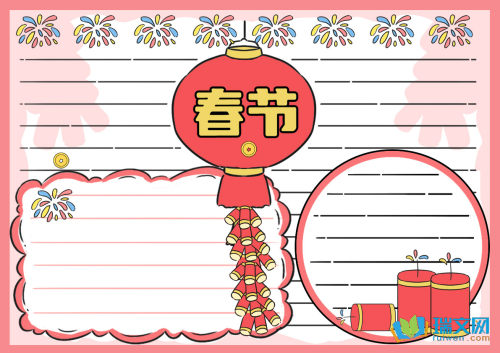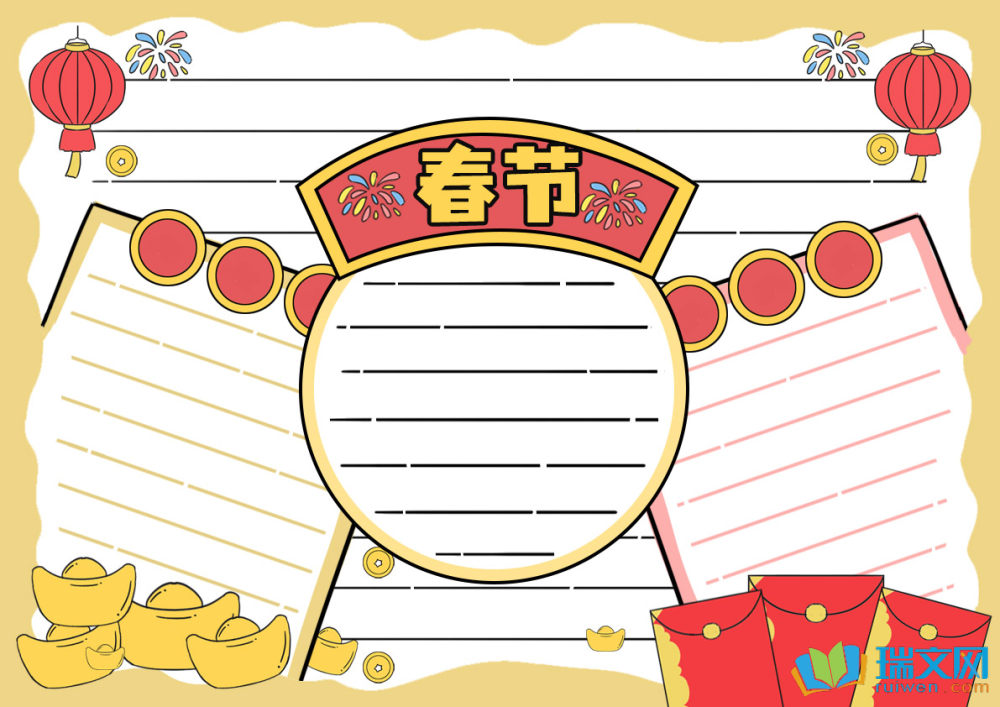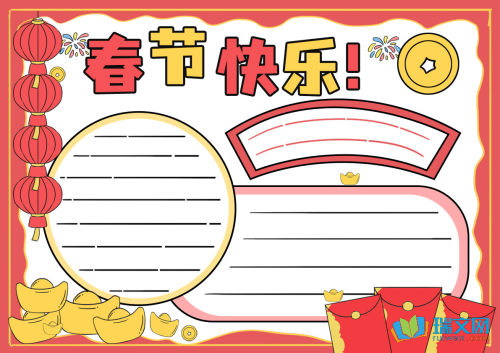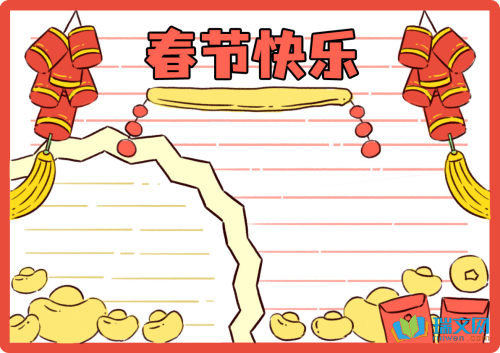春节英语手抄报资料有哪些呢?春节寄托着每一位中国人对于家的感情,是一个阖家团圆的佳节。下面是小编分享的春节英语手抄报资料,欢迎阅读!
春节英语手抄报资料





春节英语手抄报资料 1
春节的英文介绍
Chinese New Year or Spring Festival is the most important of the traditional Chinese holidays. It is sometimes called the "Lunar New Year" by English speakers. The festival traditionally begins on the first day of the first month (Chinese: 正月; pinyin: zhēng yuè) in the Chinese calendar and ends on the 15th; this day is called Lantern Festival. Chinese New Years Eve is known as chú xī. It literally means "Year-pass Eve".
Chinese New Year is the longest and most important festivity in the Lunar Calendar. The origin of Chinese New Year is itself centuries old and gains significance because of several myths and traditions. Ancient Chinese New Year is a reflection on how the people behaved and what they believed in the most.
Celebrated in areas with large populations of ethnic Chinese, Chinese New Year is considered a major holiday for the Chinese and has had influence on the new year celebrations of its geographic neighbors, as well as cultures with whom the Chinese have had extensive interaction. These include Koreans (Seollal), Tibetans and Bhutanese (Losar), Mongolians (Tsagaan Sar), Vietnamese (Tt), and formerly the Japanese before 1873 (Oshogatsu). Outside of Mainland China, Hong Kong, Macau, and Taiwan, Chinese New Year is also celebrated in countries with significant Han Chinese populations, such as Singapore, Indonesia, Laos, Malaysia, the Philippines, and Thailand. In countries such as Australia, Canada and the United States, although Chinese New Year is not an official holiday, many ethnic Chinese hold large celebrations and Australia Post, Canada Post, and the US Postal Service issues New Years themed stamps.
Within China, regional customs and traditions concerning the celebration of the Chinese new year vary widely. People will pour out their money to buy presents, decoration, material, food, and clothing. It is also the tradition that every family thoroughly cleans the house to sweep away any ill-fortune in hopes to make way for good incoming luck. Windows and doors will be decorated with red colour paper-cuts and couplets with popular themes of “happiness”, “wealth”, and “longevity”. On the Eve of Chinese New Year, supper is a feast with families. Food will include such items as pigs, ducks, chicken and sweet delicacies. The family will end the night with firecrackers. Early the next morning, children will greet their parents by wishing them a healthy and happy new year, and receive money in red paper envelopes. The Chinese New Year tradition is a great way to reconcile forgetting all grudges, and sincerely wish peace and happiness for everyone.
Although the Chinese calendar traditionally does not use continuously numbered years, outside China its years are often numbered from the reign of Huangdi. But at least three different years numbered 1 are now used by various scholars, making the year 2009 "Chinese Year" 4707, 4706, or 4646.
春节英语祝福语
I hope you have a most happy and prosperous New Year.
谨祝新年快乐幸福,大吉大利。
With the compliments of the season.
祝贺佳节。
Best wishes for the year to come!
恭贺新禧!
Good luck in the year ahead!
祝吉星高照!
May you come into a good fortune!
恭喜发财!
Live long and proper!
多福多寿!
May many fortunes find their way to you!
祝财运亨通!
I want to wish you longevity and health!
愿你健康长寿!
Take good care of yourself in the year ahead.
请多保重!
Wishing you many future successes.
祝你今后获得更大成就。
On this special day I send you New Years greetings and hope that some day soon we shall be together.
在这特殊的日子,向你致以新年的祝福,希望不久我们能相聚在一起。
I would like to wish you a joyous new year and express my hope for your happiness and good future.
祝新年快乐,并愿你幸福吉祥,前程似锦。
May the New Year bring many good things and rich blessings to you and all those you love!
愿新年带给你和你所爱的人许多美好的事物和无尽的祝福!
Rich blessings for health and longevity is my special wish for you in the coming year.
祝你在新的一年里身体健康,多福多寿。
Good luck, good health, hood cheer. I wish you a happy New Year.
祝好运、健康、佳肴伴你度过一个快乐新年。
With best wishes for a happy New Year!
祝新年快乐,并致以良好的祝福。
May its blessings lead into a wonderful year for you and all whom you hold dear.
祝福你及你所爱的人拥有美好的一年。
To wish you special joy at the holidays and all year.
祝你在节日和新的一年中享有无限的快乐。
Happy new year, my best friend.
祝我的挚友新年快乐。
A New Year greeting to cheer you, my good friend.
希望新年祝福给你带来欢乐,我的好朋友。
春节(The Spring Festival)英文介绍
The Spring Festival is the most important festival for the Chinese people and is when all family members get together, just like Christmas in the West. All people living away from home go back, becoming the busiest time for transportation systems of about half a month from the Spring Festival. Airports, railway stations and long-distance bus stations are crowded with home returnees.
Strictly speaking, the Spring Festival starts every year in the early days of the 12th lunar month and will last till the mid 1st lunar month of the next year. Of them, the most important days are Spring Festival Eve and the first three days. The Chinese government now stipulates people have seven days off for the Chinese Lunar New Year.
Many customs accompany the Spring Festival. Some are still followed today, but others have weakened.
On the 8th day of the 12th lunar month, many families make laba porridge, a delicious kind of porridge made with glutinous rice, millet, seeds of Jobs tears, jujube berries, lotus seeds, beans, longan and gingko.
The 23rd day of the 12th lunar month is called Preliminary Eve. At this time, people offer sacrifice to the kitchen god. Now however, most families make delicious food to enjoy themselves.
After the Preliminary Eve, people begin preparing for the coming New Year. This is called "Seeing the New Year in".
Store owners are busy then as everybody goes out to purchase necessities for the New Year. Materials not only include edible oil, rice, flour, chicken, duck, fish and meat, but also fruit, candies and kinds of nuts. Whats more, various decorations, new clothes and shoes for the children as well as gifts for the elderly, friends and relatives, are all on the list of purchasing.
Before the New Year comes, the people completely clean the indoors and outdoors of their homes as well as their clothes, bedclothes and all their utensils.
Then people begin decorating their clean rooms featuring an atmosphere of rejoicing and festivity. All the door panels will be pasted with Spring Festival couplets, highlighting Chinese calligraphy with black characters on red paper. The content varies from house owners wishes for a bright future to good luck for the New Year. Also, pictures of the god of doors and wealth will be posted on front doors to ward off evil spirits and welcome peace and abundance.
The Chinese character "fu" (meaning blessing or happiness) is a must. The character put on paper can be pasted normally or upside down, for in Chinese the "reversed fu" is homophonic with "fu comes", both being pronounced as "fudaole." Whats more, two big red lanterns can be raised on both sides of the front door. Red paper-cuttings can be seen on window glass and brightly colored New Year paintings with auspicious meanings may be put on the wall.
People attach great importance to Spring Festival Eve. At that time, all family members eat dinner together. The meal is more luxurious than usual. Dishes such as chicken, fish and bean curd cannot be excluded, for in Chinese, their pronunciations, respectively "ji", "yu" and "doufu," mean auspiciousness, abundance and richness. After the dinner, the whole family will sit together, chatting and watching TV. In recent years, the Spring Festival party broadcast on China Central Television Station (CCTV) is essential entertainment for the Chinese both at home and abroad. According to custom, each family will stay up to see the New Year in.
春节英语手抄报资料
Theres music in the air,A magic and a beauty
For everyone to share.
And in this New year message,There are lots of withes,too,That New year and all days
Will be happy ones for you.
新年已降临.
天际奏乐章;
奇迹与美景,众人共赏心.
新年传佳音,祝愿含温情.
新年与平素,福乐永泌心.
和春节有关的单词
春节 Chinese New Year
除夕 Chinese New Years Eve
春运 spring migration
农历 the lunar calendar
生肖 zodiac animal
春联 Paper scrolls
春晚 the Chunwan Gala
舞龙 dragon dance
舞狮 lion dance
庙会 Temple Fair
烟花 fireworks
红包 red envelope
压岁钱 gift money
鞭炮 firecrackers
灯笼 lantern
守岁 staying-up
拜年 New Years visit
团圆饭 family reunion dinner
年夜饭 the dinner on New Years Eve
和春节有关的习俗
春节是哪一天呢?
Chinese New Year falls on a different date each year. According to the lunar calendar, its dictated by the first new moon closest to the beginning of spring.
中国的春节每年的日期都不一样。根据农历,春节的具体时间是最接近春天开始的`第一个新月日。
什么是生肖?
In China, the New Year can start from like, the middle of January than to the end of February. And this lunar cycle repeats itself every 12 years. One animal represents each year, so totally 12 animals represent 12 years. The animals include the horse, goat, tiger, rooster, dog, pig. And, of course, the monkey.
中国的春节那天会在是1月中旬到2月底其间的一天。这种农历的循环每12年重复一次。每种动物代表一年,一共12种动物代表12年。生肖里包括马,羊,虎,鸡,狗,猪。当然还有猴。
本命年是好的吗?
When its your year, it is believed you are going to get more bad luck. The Chinese think that this year you are gonna offend the God of Taisui.
到了本命年,人们认为会更容易倒霉。中国人认为本命年的时候容易犯太岁。
There are a few things you can do. You just wear red. In China right now youre seeing so much red. Red is a very auspicious color.
有几件事情可以做,穿上红的就行了。在中国现在到处都看得到红色,红色是非常吉利的颜色。
请中国人过年为什么喜欢吃白菜?
The cabbage, Chinese cabbage, in Chinese we call this Baicai. And the reason why we love to eat it during Chinese New Year is if you pronounce it slightly different that means 100 fortune in Chinese.
中国大白菜,我们中国人管这叫白菜。新年里我们之所以爱吃这个,是因为在中文里,它的发音跟"百财"只有一点点不同。
过年前要做什么?
In the first five days of the New Year, we are not supposed to do any cleaning, so before that, the whole house needs to be thoroughly cleaned and everyone in the family gets involved.
在新年的头5天,我们不会做清洁活,因此节前,家里需要彻底大扫除,家庭成员都应该参加。
除了大扫除,还有什么要做的吗?
There is an interesting tradition that we need to have our haircut before Chinese New Year day. Because in China we believe that if we have a haircut, in the first month of the New Year, it will do harm to a maternal uncles health.
有个有趣的传统,中国新年前,我们必须要理发。因为中国人相信如果理发这事安排在新年第一个月,会损害舅舅的健康。
什么是春联?
Paper scrolls are normally put up on both sides of the doorway. There are certain strict rules to mirror the words, like if there is a character on the left-hand side that saying, sky, for example, there should be one on the right-hand side saying ground, and if there is rain, there is wind. If there is red, there is green. So it is kind of a thing that brings good blessing and good wishes for the New Year.
春联一般贴在门的两边。词的对仗有很严格的规定,如果左联上有一字,比如“天”字,右联必须有个“地”字,“雨”对“风”,“红”对“绿”。因此是语意万千,希望新年带来祝福和好运。
请春节期间,适合买什么作为礼物?
You know, there is a saying in Chinese for the New Year. Its actually... Meaning a dumpling with Baijiu, the more you eat or drink, the richer you will be. So if you dont mind bringing some Baijiu in for us, that will be perfect.
新年,中国有句老话,就是:饺子就酒,越喝越有。就是边吃饺子边喝酒,吃喝越多就越富有。那不介意的话就带着白酒来我家,这就完美了。
请中国人为什么喜欢去庙里拜佛?
People come here every day to make offering incense sticks and pray. But on New Years Eve, it is a particularly important day to come and to ask for health and good fortune for the coming year. To tell your fortune, you have to take a bamboo vessel filled with 100 pre-sticks and shake it until one falls out. That numbered stick is then interpreted by a fortune teller.
每天都有人来这里,来烧香祈愿,但在除夕夜,在这尤为重要的一天中,必须到此祈求来年的安康鸿运。要想预知自己的运势的话,你得先拿一个竹筒,然后摇晃里面的100根签条,直至有一根晃出来,然后拿着这根签条让算命先生算一下。
大年初一还有哪些规矩需要注意吗?
Rule number one. No medicine on the first day of the lunar New Year, because it is believed that if you take any medicine on the first day of the year, you will be ill all year. That is no good.
第一条规矩。农历大年初一不能吃药,据说如果你在初一吃了药,你全年身体都会不好。这可不妙。
Rule two, no porridge. It is a peasant food and you will be eating poor food and be poor all year if you eat porridge on the first day of the year.
第二条,不能喝粥。粥是乡下人吃的东西,吃了穷人的东西你就会变穷,新年第一天喝了粥,一年都会穷。
Rule three, no sweeping because it means you are sweeping away the wealth of the new year to come. Make sense.
第三条,不能打扫卫生,如果搞了卫生,就会把新年里的财运统统扫掉,有道理。
春节英语手抄报资料
Spring Festival is refers to the cultural circle of Chinese characters on the traditional lunar new year, commonly known as the "Festival", the traditional names for the new year, new year, new year, but verbal also known as of old, celebrate the new year, Chinese new year, is the Chinese nation most grand traditional Festival.
During the Spring Festival, Chinas Han nationality and some ethnic minorities have to hold various celebration activities. These activities are to ancestor worship God, pay homage to their ancestors, Chujiubuxin, Ying Fuk Jubilee then, pray for good harvest as the main content, rich and colorful form, with rich ethnic characteristics. Influenced by Chinese culture, some of the Chinese character culture circle of some countries and nationalities also have the custom of celebrating the spring festival. People in the Spring Festival this day as far as possible to return home and family reunion, expressing the hope for the next year and the new year of lifes good wishes.
The Spring Festival is not only a festival, but also the Chinese peoples emotional release, psychological demands to meet the important carrier, is the Chinese nations annual carnival and eternal spiritual pillar.
翻译:
春节是指汉字文化圈传统上的农历新年,俗称“年节”,传统名称为新年、大年、新岁,但口头上又称度岁、庆新岁、过年,是中华民族最隆重的传统佳节。
在春节期间,中国的汉族和一些少数民族都要举行各种庆祝活动。活动均以祭祀祖神、祭奠祖先、除旧布新、迎禧接福、祈求丰年为主要内容,形式丰富多彩,带有浓郁的各民族特色。受到中华文化的影响,属于汉字文化圈的一些国家和民族也有庆祝春节的习俗。人们在春节这一天都尽可能地回到家里和亲人团聚,表达对未来一年的热切期盼和对新一年生活的美好祝福。
春节不但但是一个节日, 同时也是中国人情感得以释放、心理诉求得以满足的重要载体,是中华民族一年一度的狂欢节和永远的精神支柱。
【春节英语手抄报资料】相关文章:
春节英语手抄报资料06-26
英语春节手抄报资料06-26
关于春节英语手抄报资料01-29
英语手抄报资料06-19
英语手抄报资料09-11
国庆手抄报资料英语06-24
国庆英语手抄报资料10-11
有关英语手抄报资料09-11
英语手抄报资料图片06-29